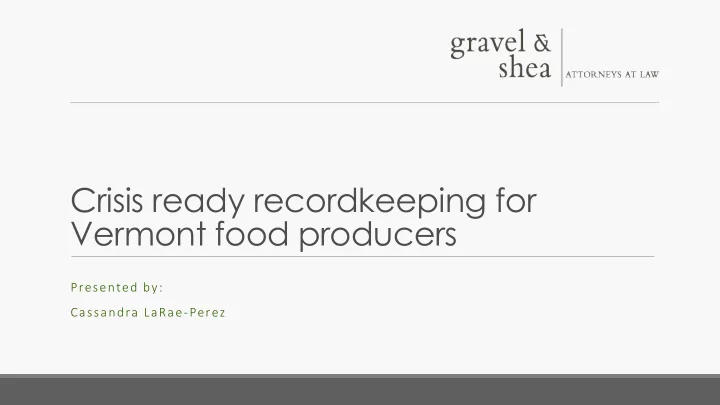

Crisis ready recordkeeping for Vermont food producers Presented by: Cassandra LaRae-Perez
Disclaimer: This is not legal advice. Do not rely on it. Please refer to original official government resources for the final word and talk to your advisors. Information is being updated and changed frequently. I will share links.
Recordkeeping in normal times Records are needed for rapid tracing of food through the manufacture, processing, packing, distribution, receipt and holding of food Records also need to trace imported foods, including ingredients imported from other Buyers (or you as a buyer) rely on supplier records to aid traceability Financial records, especially related to COVID-relief funds Employee records
Recordkeeping in normal times • Food safety/handling and traceability records (one up, one down) • GMP requirements • Specific requirements for infant formula, mean, poultry, eggs, seafood, bottled water, acidified foods, juice, color additive, animal feed • FSMA records • food safety plan (hazard analysis, preventive controls, monitoring and corrective actions, verification procedures, recall plan, food defense) • Records of actions taken under the plans, including verification measures (validation, monitoring, corrective actions, calibration of process monitoring and verification instruments, records review and plan re-analysis and updates as necessary) • Review your plans and consider whether COVID-19 prevention actions have an impact on hazards that need to be addressed • Do they introduce new hazards? • Employee training records • Employee safety • Food safety • Employee qualification records • PCQIs and others • Food transportation/carrier records (especially for refrigerated or frozen foods) • Labeling, nutrient and content claims and support
The expected unexpecteds • Unavailability of supplies or ingredients requires flexible supply chain • Many producers are increasing their ingredient inventories to prepare for another surge of demand, which may coincide with a contraction in ingredients supply • Even greater pressure on organic products • Increase in DtC or pick-and-deliver sales • Production flexibility • Unexpected or widespread employee changes • Unexpected shut downs
The expected unexpecteds • Unavailability of supplies or ingredients requires flexible supply chain • Keep records accurately, at the moment, and meticulously • Changes will occur swiftly and you won’t be able to rely on “the usual” • Be sure to hold suppliers to these same standards by contract • Increase in DtC or pick-and-deliver sales • This may increase volume and variability of traceability records. Take the time now to build a record system that can handle that • Unexpected or widespread employee changes (illnesses and/or absences) • Build in production flexibility and document it • Record meticulously personnel changes • Assign a COVID-19 response coordinator • Build in redundancy for recall teams, production teams, any other critical teams that may be deployed without notice • Document changes made to production lines for employee safety and food safety • Don’t forget to reflect these changes in your preventive control or hazard plans if they affect how food is produced. This is a part of your “re - analysis” step under FSMA • Unexpected shut downs • FDA has a mechanism for voluntarily reporting shutdowns due to COVID19 through the FDA’s Center for Food Safety and Applied Nutrition
What must the records look like • No particular format • Must be complete, accurate, timely • Must be kept on-site • Must be available for inspection • Assign a keeper of the records in case of inspection (and a co-keeper) • Records must be kept a minimum of 2 years
Links COVID-19 in the food production workplace: https://www.fda.gov/food/food-safety-during-emergencies/food-safety-and- coronavirus-disease-2019-covid-19 https://www.fda.gov/food/food-safety-during-emergencies/what-do-if-you-have- covid-19-confirmed-positive-worker-or-workers-who-have-been-exposed-confirmed https://www.osha.gov/Publications/OSHA3990.pdf https://www.cdc.gov/coronavirus/2019-ncov/community/general-business-faq.html https://www.cdc.gov/coronavirus/2019-ncov/community/organizations/grocery- food-retail-workers.html
Cassandra LaRae-Perez Special Counsel JD, Boston University School of Law BA, University of California, San Diego ◦ Leiden University Law School, Netherlands ◦ Birmingham University, England ◦ University of Burgundy, France An experienced litigator, regulatory and business attorney across a range of industries, Cassandra has tailored her claraeperez@gravelshea.com practice for New England’s food and beverage producers, 802-658-0220 most of which are small- and medium-sized companies. She also heads Gravel & Shea’s Intellectual Property practice, managing a global trademark portfolio spanning more than 50 countries. https://www.gravelshea.com/category/covid-19/
Recommend
More recommend